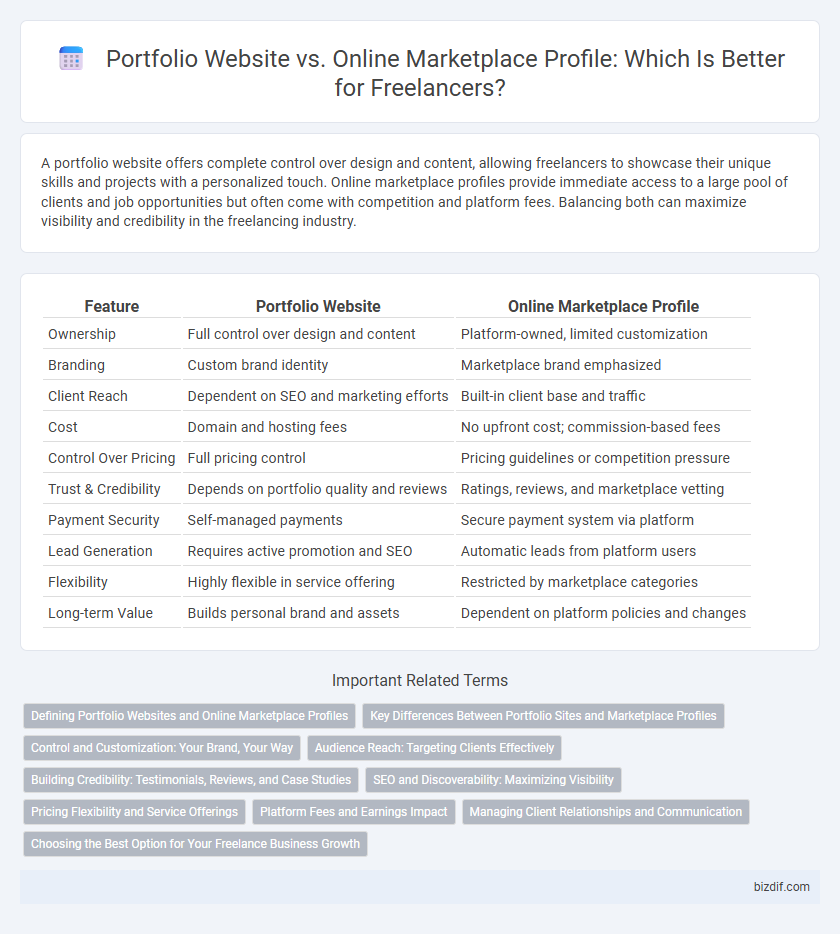A portfolio website offers complete control over design and content, allowing freelancers to showcase their unique skills and projects with a personalized touch. Online marketplace profiles provide immediate access to a large pool of clients and job opportunities but often come with competition and platform fees. Balancing both can maximize visibility and credibility in the freelancing industry.
Table of Comparison
| Feature | Portfolio Website | Online Marketplace Profile |
|---|---|---|
| Ownership | Full control over design and content | Platform-owned, limited customization |
| Branding | Custom brand identity | Marketplace brand emphasized |
| Client Reach | Dependent on SEO and marketing efforts | Built-in client base and traffic |
| Cost | Domain and hosting fees | No upfront cost; commission-based fees |
| Control Over Pricing | Full pricing control | Pricing guidelines or competition pressure |
| Trust & Credibility | Depends on portfolio quality and reviews | Ratings, reviews, and marketplace vetting |
| Payment Security | Self-managed payments | Secure payment system via platform |
| Lead Generation | Requires active promotion and SEO | Automatic leads from platform users |
| Flexibility | Highly flexible in service offering | Restricted by marketplace categories |
| Long-term Value | Builds personal brand and assets | Dependent on platform policies and changes |
Defining Portfolio Websites and Online Marketplace Profiles
Portfolio websites are personalized digital platforms showcasing freelancers' skills, projects, and professional brand, allowing for complete customization and control over content presentation. Online marketplace profiles exist within large platforms like Upwork or Fiverr, providing a structured space for freelancers to list services, gather client reviews, and access job opportunities within a competitive ecosystem. Both serve crucial roles in freelancer visibility, but portfolio websites emphasize personal branding while marketplace profiles prioritize client interaction and project acquisition.
Key Differences Between Portfolio Sites and Marketplace Profiles
Portfolio websites offer freelancers full control over design, branding, and content, allowing for a personalized showcase of skills, projects, and testimonials. Online marketplace profiles prioritize visibility within a larger platform, emphasizing client reviews, ratings, and instant access to job opportunities but with limited customization. Portfolio sites enhance professional identity and long-term brand building, while marketplace profiles facilitate quick client connections and streamlined job acquisition.
Control and Customization: Your Brand, Your Way
A portfolio website offers complete control over design, layout, and content, allowing freelancers to showcase their brand identity uniquely and professionally. Online marketplace profiles provide limited customization options, often restricting branding to predefined templates and fields. Investing in a personal website empowers freelancers to tailor their message and aesthetic to attract ideal clients effectively.
Audience Reach: Targeting Clients Effectively
A portfolio website enables freelancers to showcase a personalized brand and control the presentation of their work, attracting high-quality clients through targeted SEO and tailored content. Online marketplace profiles provide immediate access to a broad audience of potential clients but often face intense competition and limited customization options. Balancing a professional portfolio website with active engagement on freelance marketplaces maximizes client reach and enhances market visibility.
Building Credibility: Testimonials, Reviews, and Case Studies
A portfolio website allows freelancers to showcase detailed case studies, curated testimonials, and in-depth project outcomes that build strong credibility with potential clients. Online marketplace profiles provide immediate access to client reviews and ratings, which serve as social proof but often lack the contextual depth found in personalized portfolios. Combining both platforms enhances trust by leveraging the comprehensive storytelling of a portfolio site alongside the verified feedback from marketplace profiles.
SEO and Discoverability: Maximizing Visibility
A portfolio website offers full control over SEO strategies, enabling personalized keyword targeting and optimized site structure for higher search engine rankings, which significantly enhances freelance visibility. Online marketplace profiles benefit from built-in traffic and domain authority but face limitations in customization, reducing opportunities for unique SEO optimization. Combining both approaches maximizes discoverability by capturing organic search traffic and leveraging marketplace audience reach.
Pricing Flexibility and Service Offerings
A portfolio website offers complete pricing flexibility, allowing freelancers to set custom rates for services without platform-imposed fees or restrictions, enabling personalized service packaging. Online marketplace profiles often enforce standardized pricing tiers and commission structures, limiting rate adjustments and bundling options. Tailoring service offerings is more feasible on personal portfolio sites, providing freelancers control over branding and client interactions, whereas marketplaces prioritize uniformity to streamline buyer decisions.
Platform Fees and Earnings Impact
A portfolio website allows freelancers to showcase their skills and work without incurring platform fees, maximizing their earnings potential. Online marketplace profiles often charge service fees ranging from 5% to 20%, significantly reducing net income for freelancers. Choosing a portfolio website can lead to higher profitability by avoiding commissions, while marketplaces offer greater exposure but at a cost to overall revenue.
Managing Client Relationships and Communication
A Portfolio Website offers complete control over brand presentation and client interaction, enabling freelancers to showcase tailored projects and maintain direct communication channels, which strengthens personalized client relationships. An Online Marketplace Profile benefits from built-in client traffic and review systems but often limits customization and direct messaging, potentially hindering deeper client engagement. Managing client relationships effectively requires balancing the professional appearance and control of a portfolio website with the accessibility and visibility provided by marketplace platforms.
Choosing the Best Option for Your Freelance Business Growth
A portfolio website offers complete control over branding and showcases your unique skills, enhancing personal credibility and client trust. Online marketplace profiles provide immediate access to a vast client base and streamlined payment systems but often involve competition and platform fees. Evaluating your freelance niche, target audience, and long-term goals will determine whether a personalized portfolio or a marketplace profile better supports sustainable business growth.
Portfolio Website vs Online Marketplace Profile Infographic

 bizdif.com
bizdif.com